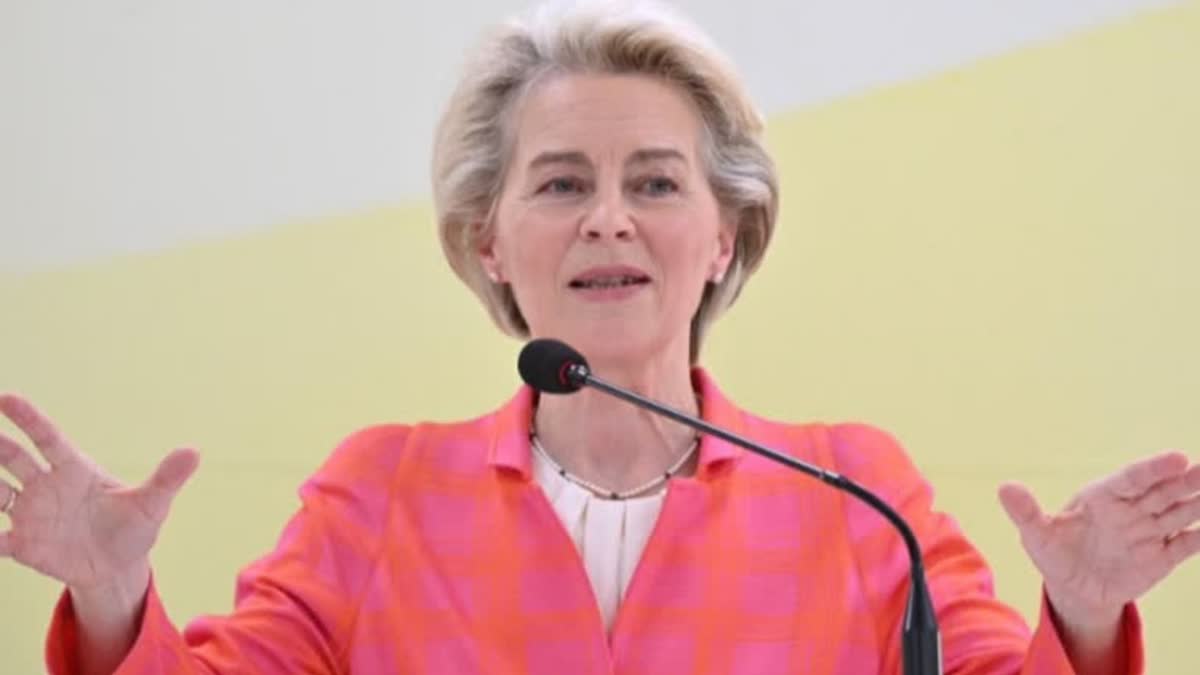New Delhi: Amid the escalating trade war, US tariff threats and three years of the Russia-Ukraine war, European Commission President Ursula von der Leyen accompanied by the college of commissioners is all set to visit India on 27 and 28 Feb.
The visit to India - one of the EU’s reliable partners - is viewed as significant at this time as geopolitical turmoil in Europe caused by Trump’s tariffs continues to loom large. Experts are of the view that the EU and India need stable partnerships in a volatile world characterised by wars, the US-China rivalry and of course, Trump’s second presidency, which only in a month is already upending the world order and the European security architecture. For Europe, this is an existential moment - the continent has witnessed its first war since the Second World War, and relations with both the US and China are under tremendous strain.
In conversation with ETV Bharat, Shairee Malhotra, Deputy Director, of ORF’s strategic studies programme said, “The fact that European President Commission Ursula von der Leyen is visiting India as her first trip abroad in her new mandate and bringing with her her College of Commissioners, given that they rarely travel en masse, demonstrates the level of importance the EU is attaching to ties with India. In her political guidelines for the new European Commission, von der Leyen had explicitly proposed a new EU-India strategic agenda as the EU-India Roadmap 2025 runs its course. This visit will likely lay the ground for what this agenda would entail followed by an EU-India summit later this year.
She pointed out that since von der Leyen’s visit to India was announced at the World Economic Forum in Davos on January 21 right after Trump’s inauguration, transatlantic ties have significantly weakened following the dramatic events of the Munich Security Conference and US officials meeting Russian officials in Saudi Arabia to negotiate an end to the war without the Ukrainians or Europeans in the room.
“In this context, the EU and India need stable partnerships in a volatile world characterised by wars, the US-China rivalry and of course, Trump’s second presidency, which only in a month is already upending the world order and the European security architecture. For Europe, this is an existential moment - the continent has witnessed its first war since the Second World War, and relations with both the US and China are under tremendous strain. Therefore, Europe is enhancing its outreach to ‘likeminded’ democratic partners such as India to deepen linkages on trade, supply chains, security, and tech cooperation and hedge against wider global uncertainties”, she added.
According to the Ministry of External Affairs, this will be President Ursula von der Leyen’s third visit to India. She has earlier visited India for a bilateral official visit in April 2022, and to attend the G20 Leaders’ Summit in September 2023. Prime Minister and President Ursula von der Leyen have also met regularly on the sidelines of multilateral meetings. This will be the first-ever visit of the EU College of Commissioners together to India and among the first such visits since the start of the mandate of the current European Commission in December 2024 after the European parliamentary elections held in June 2024.
During the visit, the Prime Minister will hold delegation-level talks with President Ursula von der Leyen. The second ministerial meeting of the India–EU Trade and Technology Council and bilateral ministerial meetings between the European Commissioners and their Indian counterparts will also be held during the visit.
Malhotra further explained that the FTA (Free Trade Agreement) negotiations are in full swing, and even though differences persist on the EU’s CBAM and new regulations on deforestation, trade will be a central focus in light of the current restructuring of the global economic order.
Reinforcing defence and security cooperation will also form part of the agenda as the EU is being compelled to recalibrate its approach to security and defence and take more responsibility. EU-India ties stand at a positive juncture epitomising stability amidst volatility, and this visit sends an important signal.
On being asked what role India plays in the EU's broader strategy for global economic stability, especially considering tensions with the US, she said, “The FTA becomes even more salient in light of US tariffs on European products and the general tilt towards protectionism in several parts of the globe. In contrast, India and Europe are adopting fresh more open approaches to trade deals as evident in India’s agreements with Australia, UAE and the EFTA bloc, and the EU’s FTAs with Mercosur and Mexico. This would serve both the EU and India’s agendas of diversifying economic partners and de-risking”.
Further, commenting on the visit, Amit Dasgupta, India’s former diplomat said, “The principal objective is to lay the groundwork for the next round of negotiations on the India-EU FTA, which is due to commence in around ten days. The EU is still processing the sharp rebuke Vice President Vance delivered to EU leaders at the Munich Security Conference and the humiliating way Washington held a bilateral dialogue with Moscow minus the EU and Ukraine. Added to this was the brazen way Elon Musk interfered in Germany's domestic politics, weeks before the federal elections, by endorsing the far-right AfD. For the EU, these are all unprecedented developments because it had, since the Second World War, put all its eggs in the Washington basket. Now, it needs to rewire and, indeed, overhaul its weltanschauung. It is time to reach out to other partners and India is a natural choice”.
“Certainly, therefore, discussions are likely to go beyond the FTA. President EU would have met President Zelensky before coming to India and the resolution of the Russia-Ukraine conflict would be raised. The EU side will share its concerns with India and seek New Delhi's support in finding a just and long-lasting solution. New Delhi would welcome wide-ranging discussions given its growing significance on the global stage. At the same time, New Delhi is likely to be cautious in its approach and not posit a counter-narrative to what Moscow and Washington have discussed in Saudi Arabia”, the former diplomat opined.
On the question as to how US tariffs on European goods factor into the EU’s approach to strengthening its relations with India, Dasgupta asserted that threatening to raise tariffs and raising them are both a bad idea because it triggers retaliatory action and consequently, a trade war. Around a hundred years ago, the US did precisely this and it led to the Great Depression.
"This is dangerous ground, and it is important to be mindful that the global economy has still not recovered from the economic slowdown triggered by the pandemic. India could certainly benefit from such a scenario and would be hungry to boost trade and investment. The EU, similarly, will be conscious of the need to adjust to the wake-up call by consolidating relations with a wider group of nations. India is ideally placed and a genuine win-win between EU and India has suddenly opened on the trade and investment front", he added.
It is pertinent to note that as the world's two largest democracies, the European Union and India share a commitment to a rules-based global order, effective multilateralism, and sustainable development. Since 2004, India has been a strategic partner of the EU, and in 2022 celebrated the 60th anniversary of their relations.
The collaboration between the EU and India from 2020 to 2025 is steered by the EU-India strategic partnership roadmap, the EU Strategy for Cooperation in the Indo-Pacific, and the Global Gateway Strategy. There are over 50 EU-India sectoral dialogues.
The EU is India's largest trading partner, with trade in goods valued at €124 billion in 2023, with an increase of almost 90% in the last decade. Around 6,000 European companies are present in India, directly providing 1.7 million jobs and indirectly supporting 5 million jobs across various sectors. The new Federation of European Business in India (FEBI) will help to boost commercial ties. The EU and India resumed negotiations on a Free Trade Agreement in 2022 following the visit of President von der Leyen to New Delhi. The next round is scheduled for 10-14 March 2025 in Brussels, the European Commission, New Delhi said in a statement.



